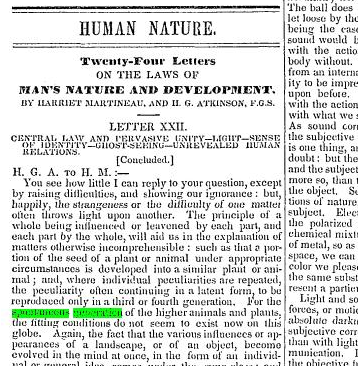Maya was interested in how the scientific theory "spontaneous generation" was disseminated and discussed in an American context in the 19th century. Spontaneous generation is a theory in which living organisms are produced from nonliving matter. While there is scholarly work done on this concept in a European context, little has been researched in terms of how this concept surfaced in the United States. She looked at databases that the library subscribes to: 19th Century US Newspapers, JSTOR, HathiTrust, and MLA International Bibliography. This ostensibly scientific and archival research will be used by Professor Goldberg in a book that concerns time and nature in 19th century American literature.
Maya said that she struggled initially with what search terms to use and that she discovered terms as she went along. "I don't specialize in the 19th century. What was normal for them was something I had to figure out." She found that metaphor and literary conventions were used in 'weird' ways; they were less scientific that she expected and more focus on narrative and personal opinion.
Upon reflection, she wished she had spent more time at the outset gaining background knowledge to inform her contextual understanding of the topic. In addition to her contribution to the research project, she gained great preparation for graduate school. She deepened her understanding of what academics do. Through their collaboration, she saw the impact of her work on Sylvan's scholarship research.
For Maya, highlights of this experience included increased understanding of methodological research in the humanities, honed research skills, and provided advice on graduate school. As for her faculty counterpoint, Sylvan, said this opportunity "helped me get on the ball with this project."
The Student Collaborative Research (SCoRe) Program supports summer research allowing students and faculty collaboratively to explore deeper into topics, by spending extended time researching in the classroom, the library, the lab, and the field.
"The SCoRe program provides an excellent opportunity for students to experience both the excitement and struggle of research. Many students have done short research projects in their courses at CC, but for most students, the SCoRe program is their first chance to fully immerse themselves in a full-time, long-term research project. Through this longer exposure to a research problem, students not only hone their technical skills and learn to become independent problem-solvers. Students also learn how to navigate the highs and lows that come with the rare breakthroughs and frequent failures of research. Learning about both the technical and human aspects of research are crucial in preparing students for graduate school and beyond." AMY DOUNAY, Associate Professor, Chemistry and Biochemistry






